

Exclusive: Emails reveal close Google relationship with NSA. Adam Berry / Getty Images Two weeks after the “60 Minutes” broadcast, the German magazine Der Spiegel, citing documents obtained by Snowden, reported that the NSA inserted back doors into BIOS, doing exactly what Plunkett accused a nation-state of doing during her interview.

Google’s Schmidt was unable to attend to the mobility security meeting in San Jose in August 2012. Google encrypts data amid backlash against NSA spying. Google’s encryption initiative, initially approved last year, was accelerated in June as the tech giant struggled to guard its reputation as a reliable steward of user information amid controversy about the NSA’s PRISM program, first reported in The Washington Post and the Guardian that month.
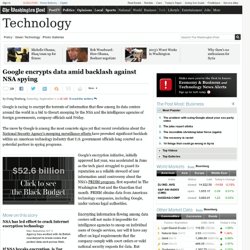
PRISM obtains data from American technology companies, including Google, under various legal authorities. Encrypting information flowing among data centers will not make it impossible for intelligence agencies to snoop on individual users of Google services, nor will it have any effect on legal requirements that the company comply with court orders or valid national security requests for data. But company officials and independent security experts said that increasingly widespread use of encryption technology makes mass surveillance more difficult — whether conducted by governments or other sophisticated hackers. An update on our war against account hijackers. Gmail scanning may violate federal wiretapping laws, judge finds. A U.S. federal judge allowed a class-action suit against Google to proceed, saying the company's terms of service are unclear when describing how it scans Gmail content in order to deliver advertisements.
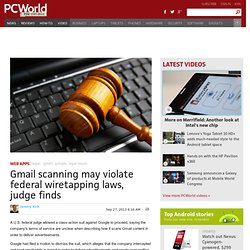
Google had filed a motion to dismiss the suit, which alleges that the company intercepted and read email while in transit in order to deliver advertisements and create user profiles and models since 2008. The plaintiffs alleged the company violated federal and state wiretapping laws. The suit, which is being heard in U.S. District Court for the Northern District of California, further contends non-Gmail users who sent email to Gmail users were also subject to illegal interception. In her ruling Thursday, U.S. Privacy groups criticize proposed $8.5 million Google settlement. Five U.S. privacy groups have opposed a proposed $8.5 million settlement with Google in a class action lawsuit over search privacy, as it fails to require Google to change its business practices, they said.

Google was sued in October 2010 in the U.S. District Court for the Northern District of California. The Internet giant allegedly transmitted user search queries to third parties without their knowledge or consent in order to enhance advertising revenue and profitability. Google shares search queries “via referrer headers,” according to a court document. The headers identify the address of a Web page that linked to the current page. The search terms can contain users’ real names, street addresses, phone numbers, credit card numbers and social security numbers, all of which increases the risk of identity theft, according to the original complaint.
On Monday, the plaintiffs in the class action lawsuit filed a motion for settlement. In a joint letter sent to Judge Edward J. Google Glass: is it a threat to our privacy? If you haven't heard about the excitement around Google Glass – the head-mounted glasses that can shoot video, take pictures, and broadcast what you're seeing to the world – then here's an idea of the interest in them.
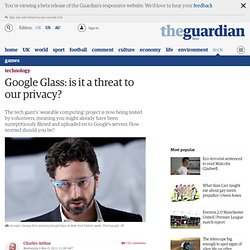
Last week, someone claiming to be testing Glass for Google auctioned their $1,500 (£995) device on eBay. Bidding had reached $16,000 before eBay stopped it on the basis that the person couldn't prove they had the glasses. (They weren't due to get them until last Friday.) Google Transparency Report. Protecting emails as they travel across the web Emails that are encrypted as they’re routed from sender to receiver are like sealed envelopes, and less vulnerable to snooping—whether by bad actors or through government surveillance—than postcards.
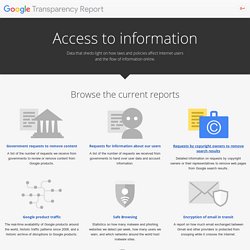
But some email is more secure than others. User Data Requests – Google Transparency Report. Like other technology and communications companies, Google regularly receives requests from governments and courts around the world to hand over user data.
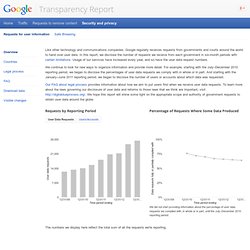
In this report, we disclose the number of requests we receive from each government in six-month periods with certain limitations. U.S. Government Requests For Google Users' Private Data Jump 37% In One Year. Want More Privacy? Sign Out Of Gmail, Facebook and Twitter After Use. Google+ Identity Crisis: What’s at Stake With Real Names and Privacy. After a steady stream of angry blog posts and heated debate among its own users over the value of pseudonymity on the web, Google announced Monday that it was revising its “real name” policy, at least for display, on Google+.
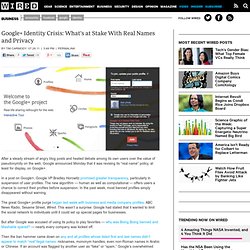
In a post on Google+, Google VP Bradley Horowitz promised greater transparency, particularly in suspension of user profiles. The new algorithm — human as well as computational — offers users a chance to correct their profiles before suspension. In the past week, most banned profiles simply disappeared without warning. The great Google+ profile purge began last week with business and media company profiles: ABC News Radio, Sesame Street, Wired. This wasn’t a surprise: Google had stated that it wanted to limit the social network to individuals until it could set up special pages for businesses. Google+ and Privacy: A Roundup. July 3, 2011 at 7:04 pm By all accounts, Google has done a great job with Plus, both on privacy and on the closely related goal of better capturing real-life social nuances. [1] This article will summarize the privacy discussions I’ve had in the first few days of using the service and the news I’ve come across.
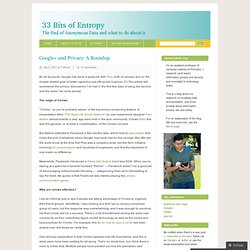
The origin of Circles “Circles,” as you’re probably aware, is the big privacy-enhancing feature. A presentation titled “The Real-Life Social Network” by user-experience designer Paul Adams almost exactly a year ago went viral in the tech community; it looks likely this was the genesis, or at least a crystallization, of the Circles concept. But Adams defected to Facebook a few months later, which lead to speculation that it was the end of whatever plans Google may have had for the concept. Meanwhile, Facebook introduced a friend-lists feature but it was DOA. Be yourself online. Google also passes on European data to US authorities.